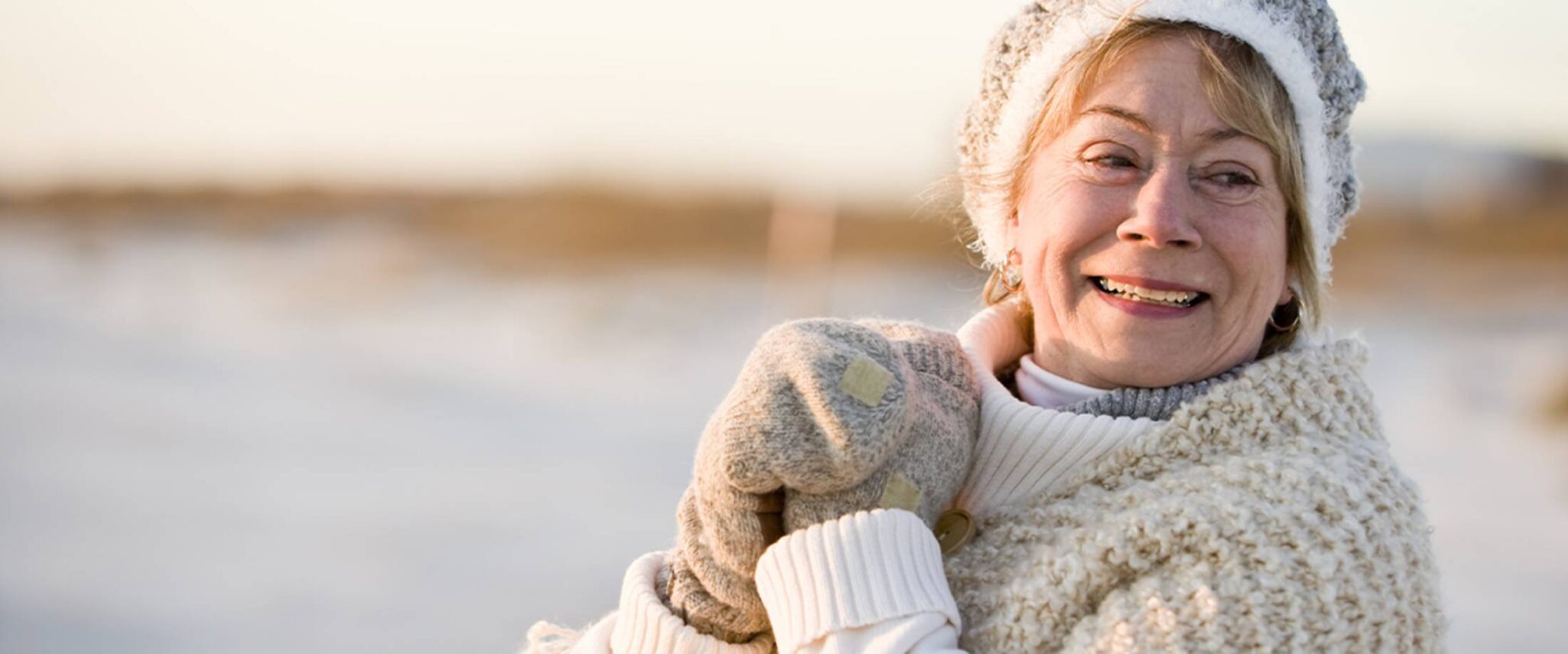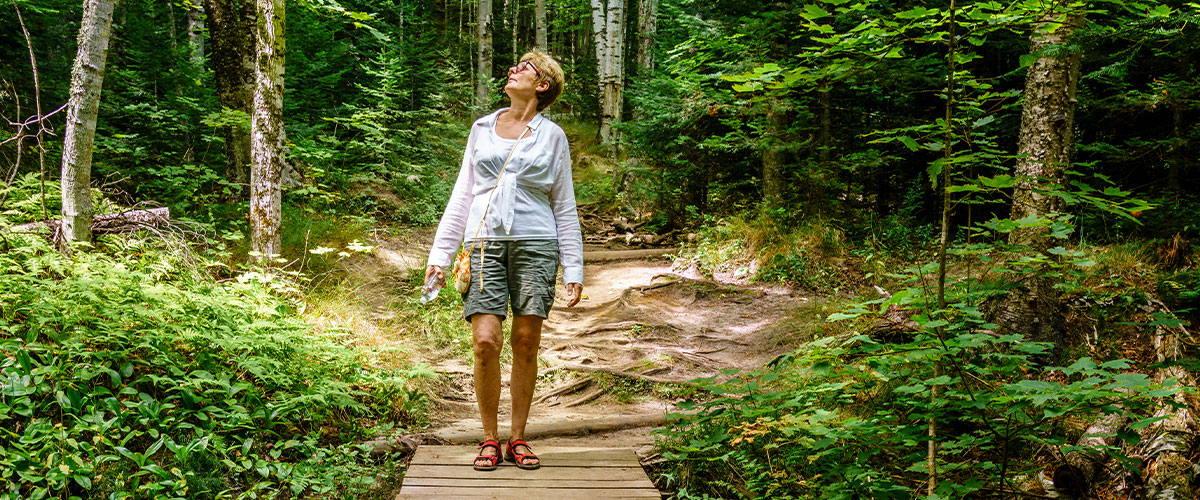Winter Safety Tips for Seniors in Michigan

Thanks to the lake effect, seniors living in Holland, Michigan, get an extra-heavy dose of precipitation each winter. All that snow makes for delightful scenery, but it can also pose some health and safety risks. Being aware of the dangers and keeping these winter safety tips for seniors in mind can help prevent accidents and allow residents to get out to enjoy the charm of this quaint lakeside community.
Snowy Chores
After enjoying the beauty of a fresh snowfall, a less attractive reality sets in: All that snow needs to be shoveled. For residents of a senior living community like Freedom Village, snow removal is provided as a one of the many residential services, but if you’re living on your own, you’ll want to take some precautions before tackling this chore.
One of the most important cold weather tips for seniors is to start by making sure you’re dressed well for the job. For a task like shoveling snow, that means plenty of warm layers and lined waterproof boots to keep your feet warm and dry. Use a shovel that you can manage comfortably; a lighter but sturdy style is a good choice because it won’t add weight to the already heavy snow.
If the depth is manageable, try pushing the snow off the path. This is far less taxing on your back and may prove just as effective as scooping. If you must scoop the snow, be sure to lift with your legs to protect your back, and avoid overextending your arms or back when you toss a shovelful away.
If you feel cold or tired, take a break to warm up and regain some energy. Even if you’re feeling ok, plan to take regular breaks to give your muscles a rest and rehydrate. Be sure to keep a phone or emergency alert device in close reach in case you encounter trouble, and if possible, avoid shoveling when you are alone.
Caution on Slippery Surfaces
While freshly fallen snow can provide reasonable traction, snow that is trampled tends to melt and refreeze, creating icy conditions that are prime for causing a fall. It’s also important to note that just because a snowy surface looks passable, there may be ice below that makes the path more treacherous than it appears at first glance.
Unfortunately, it’s not just your pride or a wet bum to worry about; a fall for older adults can cause serious injuries ranging from a nuisance to those requiring long-term recovery. Bruises and minor lacerations typically heal quickly, but more serious skin abrasions, hip fractures, other bone breaks and head trauma are other risks commonly associated with a fall.
Mature bones don’t always heal as quickly as they did in your younger days, and less muscle tone can also affect your recovery. That’s why it’s important to use caution when traveling on slippery surfaces during the winter season.
When venturing out during the winter months, it’s a good idea to assume you’ll encounter poor conditions and prepare with cold weather safety in mind. That means wearing shoes with strong soles that help you maintain traction. You might also benefit from carrying a cane with a fresh tip to help you keep your balance.
Remember that you can track your wintery weather risk back indoors, too. Be sure to shake loose any snow or sediment from your shoes before entering your home, and remove your shoes right away to prevent tracking in snow and debris that could cause a slipping hazard indoors.
When Cold Is Too Cold
As your body ages, it becomes less efficient at producing energy and warmth, which may be part of the reason you feel cold more often or more easily. Managing body temperature is a critical element of winter safety for seniors.
Hypothermia is a condition in which your body is losing heat faster than it regenerates, and it’s a situation that can quickly escalate to life-threatening status because it can slow your body’s ability to function.
Another concern for seniors when it comes to cold weather safety is frostbite. If you have circulation problems in your extremities, like your fingertips or toes, you can be at an elevated risk for frostbite because blood isn’t adequately reaching these areas to keep them warm. While hypothermia affects your entire body, frostbite is usually localized to a specific part of your body. With frostbite, your skin freezes, which can cause permanent damage to the skin and nerves, and even result in amputations.
For seniors, hypothermia and frostbite can set in more quickly than they may for younger generations. You might be surprised to learn that hypothermia is even possible indoors, so be sure to keep the thermostat set above 68 degrees, dress to ward off a chill, and keep throw blankets handy to snuggle into when the air feels cool.
Heat loss and resulting hypothermia can occur significantly faster in wet conditions, so staying both warm and dry is key. Avoid going out without properly covering every part of your body, including gloves, scarves and hats, along with a long, warm coat. Dress in loose layers that you can shed and adjust to your comfort when you reach your destination.
Dangers in the Air
When you’re spending more time indoors and relying on a fireplace, gas-powered heater or other powered heat sources to keep you comfy and warm, another winter safety concern is the increased risk of carbon monoxide poisoning. This type of poisoning is especially troublesome, because people often don’t realize they’ve encountered carbon monoxide until they’re already feeling its very dangerous effects, which can include a loss of consciousness and even death.
You can’t see or smell a carbon monoxide leak, so the best prevention is a reliable carbon monoxide detector in your home. If you have multiple levels, many experts recommend placing a detector on each level. Batteries should be checked monthly, and you should plan to replace each detector every five years to ensure you don’t exceed the device’s best operating life.
Also be aware of the signs of carbon monoxide poisoning, which can include a headache, nausea, dizziness and disorientation. If you suddenly notice these flu-like symptoms while operating a device that may emit carbon monoxide, immediately leave the premises and seek medical attention.
Keeping Tabs on Health
Some medical conditions are actually worsened by the cold. For example, if you have thyroid problems or diabetes, you may have even more trouble regulating your body temperature. Memory loss can also pose a risk if, for example, you forget to dress appropriately for the weather or lose track of time while outdoors. Cold air can also exacerbate breathing troubles, and afflictions like arthritis can make it painful or even possible to complete simple tasks like zipping a coat.
For all these reasons and more, managing your health throughout the winter season is especially important. Talk with your doctor about any special steps you should take to protect your health and which preventive measures, like getting a flu shot, are right for you.
Avoiding Seasonal Doldrums
The same snow that elicits childlike delight in some can have quite a different effect on others. If your normal routine and mobility are limited by the cold and weather conditions, your mental health can suffer. Add the shorter, darker days of the winter season, and it’s little surprise that depression and loneliness tend to spike during the colder months. Mental health conditions also affect winter safety for seniors.
Social interaction is one way to combat the winter blues. Regular chats with neighbors and family members can help you maintain a sense of connection, even when you’re cooped up inside. Passing time with activities that you enjoy can also help make extended periods indoors more bearable.
Try to find a mix of diversions that blend pure entertainment, like favorite movies or TV programs, with projects that keep your mind sharp, like crossword puzzles or curling up with a good book. Exercise is another good idea. Exercising regularly will help keep your muscles strong so you can enjoy getting out and about when conditions allow; it also releases feel-good chemicals that naturally improve your mental health.
Although your preferred routine may be interrupted, don’t write winter off as a complete lost cause. Look for chances to get outdoors and take in some fresh air on a bright, sunny day, even if it’s just a brief trip to your patio. You can also use the time to complete tasks you’ve been putting off for “someday,” like organizing your photo albums or sorting unwanted items to donate.
Now that you’re armed with all these winter safety tips for seniors to help you stay safe and well, you can get ready to enjoy watching the snowflakes dance to the ground and pile up to create a winter wonderland all around you.
Around Holland, the average snowfall per month can reach up to 26 inches, which is great for seniors who love to ski and spend time outdoors! Those who live at Freedom Village never have to worry about removing snow or navigating icy sidewalks; all snow and ice removal is taken care of by our hard-working team members. And when our residents head into town, they enjoy the snow-free sidewalks and roads in Holland, thanks to their snowmelt system that keeps roads and sidewalks heated and clear of snow.




